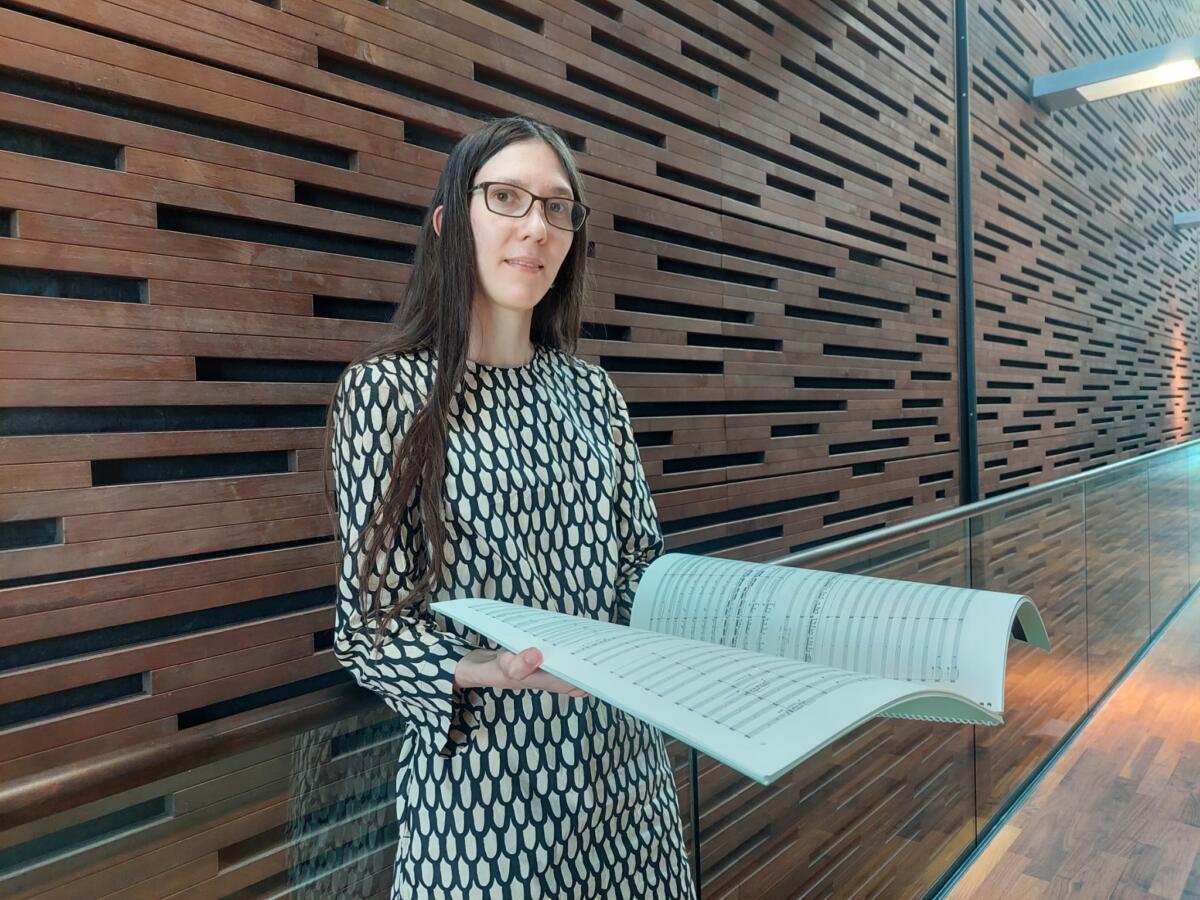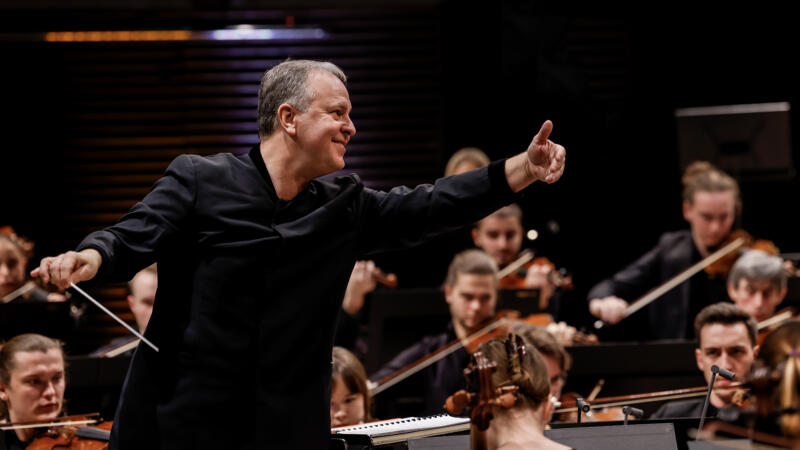The personalities of cows and horses come to life in Lara Poe’s new orchestral work
Composer Lara Poe listened to stories from her grandmother’s childhood on a farm in Espoo. These tales inspired a seven-part piece, Songs from the Countryside, which will have its premiere at the world’s largest classical music festival, the BBC Proms, in August 2024.

Where did the inspiration for Songs from the Countryside come from, and how did it turn into a composition?
From the start, I knew that I would write this piece specifically for Anu Komsi and Sakari Oramo. I first heard Anu perform a cattle call during the BBC Symphony Orchestra’s “Total Immersion Day.” At that moment, I knew I wanted to learn more and explore how I could incorporate it into my own work. My grandmother Heljä – nicknamed Tidi – grew up on a farm in Espoo that had cows, horses, and pigs, among other animals. During the war, evacuees from Karelia also came to the farm with their animals. I had a rather general idea of all this, but through this process, I’ve added many details to the story and learned a lot about my grandmother’s history. It’s been wonderful.
What are the texts about?
The texts are excerpts from our conversations – for instance, how my grandmother described various individual animals, cows and horses, and the arrival of evacuees at the farm. The piece begins with a cattle call, partially based on a transcription of a traditional cattle call I heard; I made my own arrangement of it. The cows mentioned in the text are all named and were part of my grandmother’s childhood. The piece describes their personalities through words and music. There’s Mustike, Mansike, Pähkinä, and others: the stories tell of their characters and how some, for example, tended to escape to the neighbour’s fields despite all efforts to keep them in the pasture.
The text for Myrsky (Storm) was created in collaboration with my aunt. Hevoset (Horses) tells the story of Finnish horses during the war. One of them on my grandmother’s farm, called Ympyrä, used to lead others to the underground potato cellar for safety when it heard the sound of planes, while another one, called Piirto, refused to cross bridges. I wanted to express each animal’s personality through different textures, orchestration, and rhythmic choices. The Karelian evacuees bring folk song elements to the piece, such as the traditional melody Karjalaiset paimenet (Karelian Shepherds).
What has it been like collaborating with Anu Komsi and composing specifically for a particular voice?
A composer needs to have a very clear image of the singer they are writing for. First, you need to get to know the voice well by listening to a lot of recordings or concerts. That’s how the work begins. Anu Komsi got involved quite early in the process, and I took into account what she told me about her voice. This is especially important in this case; Anu has a truly wonderful voice with a unique timbre and range. She has also worked with many other composers, which influenced the process: she could explain and demonstrate what works for her voice and what doesn’t. She has premiered many pieces, and there are also several recordings of works written for her, which helped me understand what her voice is like. A big part of the collaboration is always practical. Generally, it’s often good for a singer to have some harmonic basis in the piece, as it adds confidence. Anu, as a singer, is the focal point of this piece and conveys the story. The instrumentation of the piece has also been largely shaped by Anu’s voice.
What was the creative process of writing this piece like?
In this piece, the text was the central starting point. I had some idea of the harmonic areas I wanted in different parts of the piece and the kinds of characters I wanted for different sections. I find that I’ve also reserved certain colours, sound registers, and shades for specific moments to make them stand out and be heard better.
What do you think about the piece having its world premiere at the world’s largest classical music festival, the BBC Proms, as a collaboration between the Sibelius Academy and the Royal College of Music?
It’s absolutely fantastic! I could never have imagined that my piece would be featured in such an event so early in my career. I am incredibly grateful to Sakari and Anu for believing in me and this piece throughout the process. I studied at the Royal College of Music, so it feels like returning to a familiar environment. I’ve also attended the Proms as a listener. In England, I will need to explain the background of this piece differently than to Finnish audiences, who are more familiar with our countryside and history. What, for example, are Karelians and the evacuee culture? What significance did animals – such as horses – have for Finns during the war or on Finnish farms decades ago? It’s also wonderful that my Finnish family can hear the piece here in Helsinki.
How would you like this piece to perhaps change people’s views on their relationship with animals?
Horses have been essential means of transportation, and cows have been important production animals. However, in this piece, animals have a very different role. I wanted to highlight that these cows and horses were not just basic farm animals – each one was an individual with its own personality. They had their own behaviours, and some were also difficult. I also wanted to show that the war affected animals too. This serves as a metaphor for how war impacts society more broadly – this is also evident in the Karelians section.
You studied at the Royal College of Music. What were your composition studies like there?
They mainly consisted of composition lessons and provided quite a lot of time for writing – although often with very tight schedules. During the study phase, the institution often provides deadlines and does a lot of the planning for you. Nowadays, I wouldn’t want to stack multiple projects on top of each other in the same way – I prefer focusing on one project at a time. It’s also essential to find a composition teacher you get along with well. I’ve had good experiences with this – my main teacher at the Royal College of Music was Kenneth Hesketh. He is a really good teacher, and I’ve learned a lot from him. After that, I have been pursuing my doctoral studies at King’s College London, where I am a student of George Benjamin – he is also an excellent teacher. In the professional world, I think it’s important for a composer to know their craft well and, on the other hand, to go and listen to what’s out there – to get to know their environment. Networking is also useful: finding people who can perform your works or whom you can ask for help if you have questions for example about the sound of a particular instrument or writing for it.
What kind of opportunities do you have as a composer to influence societal phenomena?
I might be able to bring culture to the forefront. I think children should be openly introduced to contemporary composers – to tell them and show them that they can compose too, that there are no barriers to it. In England, there isn’t public funding for music education in the same way as here in Finland. There, it’s more dependent on a child’s family background, what kind of music education they have access to. Fortunately, we don’t have that situation here. Let’s keep it that way!
What are you most looking forward to about these concerts in London and Helsinki?
I’m looking forward to my piece coming to life, of course. It’s always wonderful to hear a new piece for the first time – there’s something magical about it. In this case, it’s also great that the piece will be performed in two different places, with different spaces and acoustics.
Over the first rehearsals, I have come to know the Sibelius Academy Symphony Orchestra – the collaboration with the orchestra, as well as with Sakari and Anu, has been an absolutely fantastic experience. These musicians are enthusiastic and young. Writing for a student orchestra has been a bit different – there are some challenging passages in this piece, and as a composer, I have taken some risks. On the other hand, I know that a student orchestra has a bit more rehearsal time than a professional orchestra. I really enjoy writing for an orchestra.
